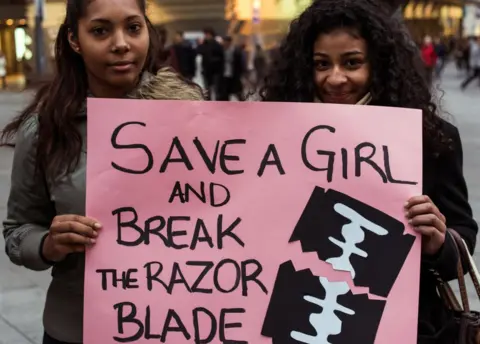FGM clinics open across England to support victims
 Getty Images
Getty ImagesA victim of female genital mutilation (FGM) who was traumatised by her reversal procedure has welcomed the opening of support clinics in England.
Jane, not her real name, said she felt "helpless" following the operation, blaming a lack of emotional support.
Now eight walk-in FGM centres, in Birmingham, Bristol, Leeds and five London boroughs, will offer women aged over 18 expert care, NHS England says.
Staff will include specialist doctors, midwives, nurses and counsellors.
Jane, who sought an FGM reversal in her 30s, said such a service would have "opened so many doors" for her as a young woman.
She added that it may have helped her avoid "psychological damage in the long-run".
"I think it should be reaching out to girls under 18 because they don't know what services are available to them," she said.
The illegal practice of FGM is carried out for cultural and religious reasons in certain communities.
It involves the partial or total removal of the female external genitalia or other injury to the female genital organs for non-medical reasons.
In the last three months, almost 1,000 women and girls were identified as having been affected by FGM.
More than 1,300 women are expected to benefit from the clinics, which will prioritise swift support and treatment for young women aged between 18 and 25.
Typically, victims of FGM are first identified and offered support when they are pregnant and access NHS maternity services, according to NHS England. This is usually between the ages of 25 and 35.
The new support clinics will aim to reach women before they are pregnant.

'Isolated and alone'
Jane, who was cut when she was four-years-old, had a reversal procedure in the UK last year.
"I didn't think of getting a reversal when I was a young adult. It was frowned upon in my culture and my community," she told BBC News.
She says it took more than four years to access the procedure through the NHS, during which time she was told by two GPs that it would have to be arranged privately at a cost of up to £4,000.
"The whole ordeal was horrible," she says. "When I went for the procedure, there was no explanation.
"I was given four injections to numb the area because I could still feel something.
"Then there was no aftercare or advice. The stitches were beyond comfort.
"I couldn't sleep, walk or do anything. I felt helpless and alone and isolated.
"Having the reversal was a relief, but there was no relief for me in the aftercare and emotional support that I needed.
"It's just been from one trauma to the next."

Women will be able to discuss treatment options at the new centres, including de-infibulation - a minor procedure that is performed to divide the scar tissue which narrows the vagina in certain cases of FGM.
Hilary Garratt, deputy chief nursing officer for England, said: "These are clinics for women, run by women.
"We've listened closely to survivors and their advocates and designed these services with them, meaning they represent a step-change in the quality and timeliness of support the NHS provides."
Another victim of FGM told the BBC the clinics offer "a way forward" by allowing women to "speak out" about how it has affected them physically and mentally.
Patricia Mansaray, who was cut in Sierra Leone when she was primary school age, told BBC London she understands that FGM was "part of the culture" for her parents.
But she said she does not support the practice as she urged other victims to "seek help" and "educate the next generation" against it.
"Don't be afraid, be a voice to the voiceless," she said. "I think it's time for them to get the message that they should stop it."
Health Secretary Matt Hancock said: "It's absolutely crucial we reach more women so they can access support services that take care of mental, emotional, physical and clinical needs."
The clinics will also work with local community groups - including Women's Health and Family Services, Manor Gardens (Dahlia Project), Forward, and AYDA Centre - in an effort to prevent future cases by seeking to change the culture around FGM.
Naana Otoo-Oyortey, the executive director of Forward (the Foundation for Women's Health Research and Development), said: "The community advocates at these clinics will provide valuable outreach to address much needed prevention work that is underfunded within the UK.
"Unfortunately, these new services still do not cater to under 18s. This could be due to the mandatory reporting policy for FGM which regulated health and social care professionals and teachers in England and Wales to report known cases to the police. This is a major deterrent for young girls under 18 who want to access support services for FGM."
Miranda Dobson, communications manager for Orchid Project, said: "It's especially encouraging to see that this network of clinics will work with local community groups, which we hope will encourage more survivors to seek health services free from stigma.
"We also hope that services will be expanded to meet any increases in demand as we know that data on the number of women and girls affected by the practice in the UK are incomplete."
The London clinics opening are located in Brent, Waltham Forest, Croydon, Hammersmith and Tower Hamlets.
